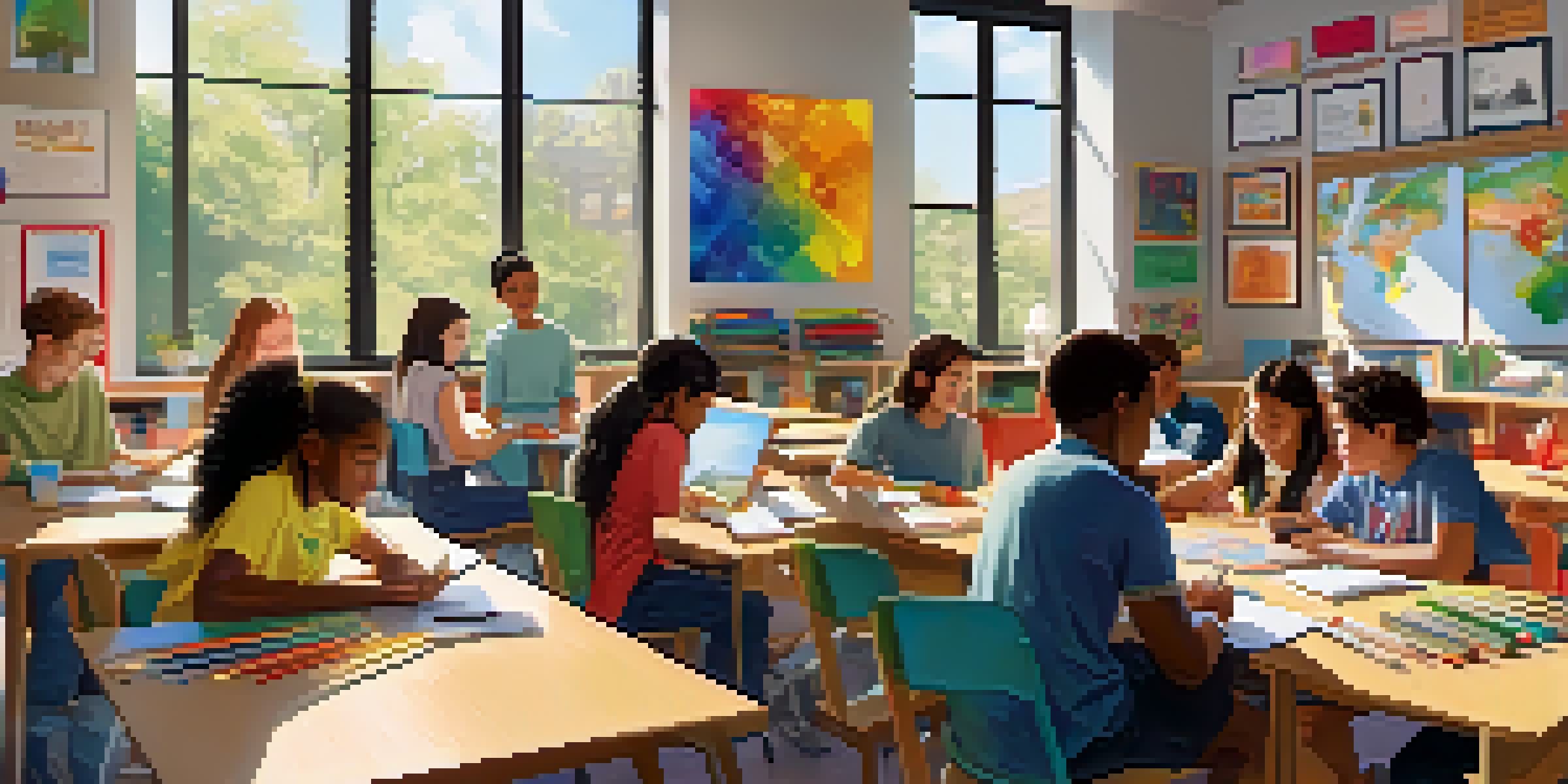Key Theorists Behind Constructivist Learning: An Insight

Understanding Constructivism: A Brief Overview
Constructivism is a learning theory that posits learners construct knowledge through experiences. Rather than passively absorbing information, students engage with material, leading to deeper understanding. This approach emphasizes active involvement, critical thinking, and real-world application of knowledge.
The best way to predict the future is to create it.
The roots of constructivism can be traced back to various educational theorists who challenged traditional learning methods. They believed that learning is not merely a transfer of facts, but a process of building understanding. This paradigm shift has significant implications for teaching strategies around the world.
By fostering an environment where students engage with content, constructivism encourages curiosity and exploration. It invites learners to ask questions, collaborate, and reflect on their experiences, making education a more dynamic and personalized journey.
Jean Piaget: The Pioneer of Cognitive Development
Jean Piaget, a Swiss psychologist, is often recognized as a foundational figure in constructivist learning. He proposed that children progress through stages of cognitive development, each characterized by distinct ways of thinking. This insight urged educators to consider developmental readiness when introducing new concepts.

Piaget's theory emphasizes that learners actively construct their understanding by interacting with the world around them. For instance, a child learning about gravity might drop different objects to see which falls faster. This hands-on experimentation fosters deeper comprehension and retention.
Constructivism Enhances Learning
Constructivism encourages active involvement and critical thinking, enabling students to construct knowledge through experiences.
His ideas encourage educators to create learning environments that support exploration and discovery. By recognizing the stages of cognitive development, teachers can tailor their approaches to meet the unique needs of their students, making learning both effective and engaging.
Lev Vygotsky: Social Interaction and Learning
Lev Vygotsky, a Russian psychologist, expanded on constructivism by emphasizing the importance of social interaction in learning. He introduced concepts like the 'Zone of Proximal Development' (ZPD), which highlights the gap between what a learner can do independently and what they can achieve with guidance.
Learning is an active process. We learn by doing. Only knowledge that is used sticks in your mind.
Vygotsky believed that through collaboration and dialogue with more knowledgeable others, learners could reach new heights in understanding. For example, a student might struggle with a math problem until a peer explains a different approach, illustrating the power of collaborative learning.
His work encourages educators to facilitate group activities and discussions, allowing students to learn from each other. This social aspect of learning not only enhances comprehension but also builds critical social skills and confidence in learners.
Jerome Bruner: Discovery Learning and Curriculum Design
Jerome Bruner, an American psychologist, introduced the concept of 'discovery learning,' advocating for students to explore and discover information on their own. He believed that when learners engage in problem-solving and exploration, they develop a deeper understanding of concepts.
Bruner also emphasized the importance of scaffolding, where educators provide temporary support that is gradually removed as learners gain independence. For instance, a teacher might guide students through a complex project, gradually allowing them to take control as they become more confident.
Key Theorists Shape Constructivism
Figures like Piaget, Vygotsky, and Bruner have significantly influenced constructivist principles, emphasizing exploration, social interaction, and discovery learning.
His ideas have had a profound impact on curriculum design, encouraging the integration of real-world problems and inquiry-based learning. By fostering an environment that promotes exploration, educators can ignite students' natural curiosity and drive for knowledge.
David Ausubel: The Role of Prior Knowledge
David Ausubel, an educational psychologist, emphasized the significance of prior knowledge in the learning process. He argued that meaningful learning occurs when new information is connected to existing knowledge structures. This connection helps learners retain and apply new concepts more effectively.
Ausubel introduced the concept of 'advance organizers,' tools that help bridge the gap between what learners already know and what they are about to learn. For example, a teacher might present a brief overview of a topic before diving into the details, aiding comprehension.
His focus on meaningful learning encourages educators to assess students' prior knowledge before introducing new material. By doing so, teachers can tailor their lessons to build on what students already understand, making learning more relevant and impactful.
Constructivist Learning Environments: Key Principles
Constructivist learning environments are designed to foster engagement, collaboration, and critical thinking. Key principles include promoting active learning, encouraging exploration, and supporting social interaction among learners. These principles create a dynamic atmosphere conducive to deeper understanding.
In such environments, teachers act as facilitators rather than mere distributors of knowledge. They guide students in their explorations, creating opportunities for inquiry and discussion. This shift in role empowers learners to take charge of their education, fostering a sense of ownership.
Future of Education Embraces Change
The future of constructivist learning looks promising as educators adopt innovative practices and personalized learning approaches to engage students.
By implementing constructivist principles, educators can create rich learning experiences that resonate with students. As learners engage with content actively, they develop essential skills such as problem-solving, collaboration, and adaptability, preparing them for future challenges.
Challenges and Critiques of Constructivist Learning
While constructivist learning has many benefits, it also faces challenges and critiques. Some educators argue that it may lead to gaps in foundational knowledge if not implemented carefully. Striking a balance between exploration and direct instruction is crucial to ensure comprehensive understanding.
Additionally, the effectiveness of constructivist approaches can vary based on student readiness and learning styles. Not all learners thrive in an open-ended environment, and some may require more structured guidance. Understanding these differences is essential for effective teaching.

Despite these challenges, many educators find that when constructivist principles are thoughtfully integrated, they can lead to profound learning experiences. By remaining adaptable and responsive to student needs, teachers can harness the strengths of constructivism while addressing its limitations.
The Future of Constructivist Learning in Education
The future of constructivist learning in education is bright, with an increasing recognition of its effectiveness. As educators continue to embrace technology and innovative teaching practices, constructivist principles can be integrated in new and exciting ways. For example, online collaborative platforms offer unique opportunities for students to engage in group projects.
Furthermore, the shift towards personalized learning aligns well with constructivist ideals. As schools focus on tailoring education to individual needs, students can explore topics that resonate with their interests. This customization fosters motivation and a deeper connection to learning.
Ultimately, as we move forward, the principles of constructivism will remain relevant in shaping educational practices. By nurturing curiosity, collaboration, and critical thinking, we can prepare learners for a rapidly changing world, equipping them with the skills needed for success.